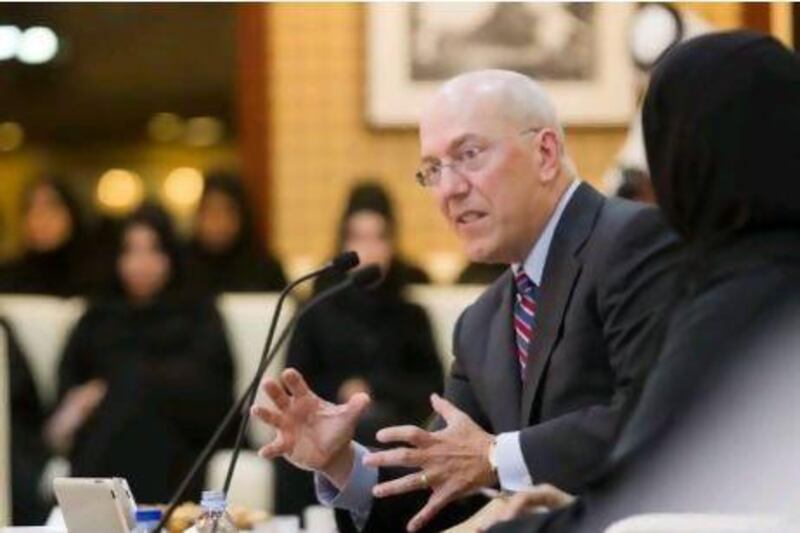ABU DHABI // A test that checks cardiac oxygen levels in newborns has been given to 18,000 babies since it was introduced in the UAE last year, saving the lives of 10 babies.
The exam also won praise from the head of the Children's National Medical Centre in Washington.
The Health Authority-Abu Dhabi introduced the pulse oximetry test at Al Ain's Tawam Hospital in January last year.
"These results are just amazing and remarkable," Dr Kurt Newman, president and chief executive officer of the US centre, said on Monday at the majlis of Sheikh Mohammed bin Zayed, Crown Prince of Abu Dhabi and Deputy Supreme Commander of the Armed Forces.
"You should be proud - you are the first country to do this."
The procedure uses a light probe on the baby's right hand and right foot to measure oxygen in red blood cells. It is carried out a day after birth and takes three minutes.
Abu Dhabi was the first place in the Gulf to implement universal screening, and introduced it even before the US.
Dr Newman described the test as the perfect example of how paediatrics could be used as preventive medicine to stem the high rates of heart disease and diabetes in the UAE.
He told a parable of two men who were fishing at a fast-flowing river when first one, then many people, started to float by, yelling for help.
The first man jumped into the water to save as many as he could, while the second ran upstream.
"Where are you going?" yelled the man who had jumped into the river, thinking his friend was not willing to help. "I'm going upstream to stop whoever is pushing them," he replied.
Paediatrics, Dr Newman said, was much like this story - instead of waiting to cure ailments, paediatricians could focus on prevention.
"The new vision for children's medicine is becoming a reality at the Zayed Institute," he said, while explaining the work of the Sheikh Zayed Institute for Paediatric Surgical Innovation in Washington, founded with a US$150 million (Dh551m) gift from the Government of Abu Dhabi.
"We are facing big challenges," Dr Newman said. "Three million children die every year in the first month of their life, and 830,000 will die every year because of accidents. As we try to solve it, we brought two nations closer together to make children's lives better."
Dr Newman praised the use of technology, which made it possible for doctors in the UAE to discuss problems with their counterparts at the US centre. He showed the majilis a picture of a virtual consultation that took place between doctors in Washington and the UAE about a patient in Fujairah.
Back in Washington, Dr Newman said, the institute was using technology to create robots that perform paediatric surgery.
There are already robots designed to operate on adults, which can carry out more precise and less invasive procedures. But Dr Newman said there were none designed for children.
The institute is also working to replace the current self-evaluation pain scale used to assess how badly and where children are hurt.
"I foresee hospitals with no pain," Dr Newman said.
Asked by a member of the majlis what could be done to prevent diseases resulting from inter-family marriages, Dr Newman said genetics was the answer.
"Knowing about this ahead of time can empower families and couples to make wiser decisions," he said.





